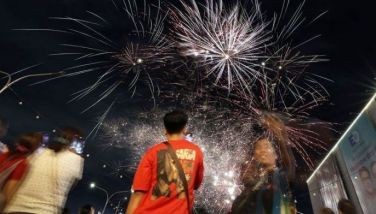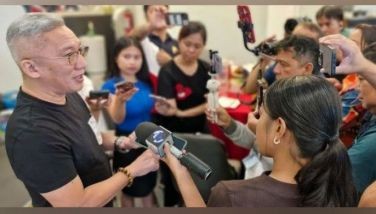Plebiscite on Lapu conversion to "highly urbanized city" ok'd
March 20, 2007 | 12:00am
The Commission on Elections approved en banc the holding of a plebiscite on the conversion of Lapu-Lapu from component city into a "highly urbanized city" simultaneously with the May 14 polls.
In a copy of Minute Resolution No. 07-236 signed by Comelec chairman Benjamin Abalos, dated February 13, the Office of the Deputy Executive Director for Operations was directed to prepare pertinent resolutions for the plebiscite in changing the status of Lapu-Lapu from a component city of the Province of Cebu into a highly urbanized city.
Resurreccion Borra, commissioner-in-charge of Comelec-7, finds the request of Comelec law department director Alioden Dalaig "valid and practical under the given circumstances." This includes a certification of fund availability amounting to P10 million for the holding of a plebiscite.
The city's income reached P603.47 million in 2005 and its population was recorded at 217,019 as of 2000.
Section 452 (a) of the Local Government Code states that "cities with a minimum population of 200,000 inhabitants, as certified by the National Statistics Office, and annual income of at least P50,000,000 based on the 1991 constant prices, as certified by the city treasurer, shall be classified as highly urbanized cities."
President Arroyo, last January, proclaimed Lapu-Lapu as highly urbanized city with the issuance of Presidential Proclamation No. 1222. Once a component city is converted into a highly urbanized city, increase in taxes varies directly with the increase in salaries of its employees and officials. This according to Presidential Proclamation 1222.
More benefits include additional forces and additional fund allocation for maintenance and other operating expenses.
Presently, there are two highly urbanized cities in the province- Cebu City and Mandaue City. But Cebu City is independent from the province and its voters do not vote for provincial elective officials as provided for in its own Charter.
Voters in Mandaue City, meanwhile, are given the right to exercise voting for elective provincial officials though it was declared a highly urbanized city after Cebu City.
If the "yes" vote will win in favor of the conversion of Lapu-Lapu City's status, still the city will have to vote for provincial elective officials under Section 452 of the Local Government Code.
Law on conversion into highly urbanized cities states that "qualified voters of cities that acquired the right to vote for elective provincial officials prior to the qualification of said cities as highly urbanized, after the ratification of the Constitution and before the effectivity of this Code, shall continue to exercise such right." - Garry B. Lao/MEEV
In a copy of Minute Resolution No. 07-236 signed by Comelec chairman Benjamin Abalos, dated February 13, the Office of the Deputy Executive Director for Operations was directed to prepare pertinent resolutions for the plebiscite in changing the status of Lapu-Lapu from a component city of the Province of Cebu into a highly urbanized city.
Resurreccion Borra, commissioner-in-charge of Comelec-7, finds the request of Comelec law department director Alioden Dalaig "valid and practical under the given circumstances." This includes a certification of fund availability amounting to P10 million for the holding of a plebiscite.
The city's income reached P603.47 million in 2005 and its population was recorded at 217,019 as of 2000.
Section 452 (a) of the Local Government Code states that "cities with a minimum population of 200,000 inhabitants, as certified by the National Statistics Office, and annual income of at least P50,000,000 based on the 1991 constant prices, as certified by the city treasurer, shall be classified as highly urbanized cities."
President Arroyo, last January, proclaimed Lapu-Lapu as highly urbanized city with the issuance of Presidential Proclamation No. 1222. Once a component city is converted into a highly urbanized city, increase in taxes varies directly with the increase in salaries of its employees and officials. This according to Presidential Proclamation 1222.
More benefits include additional forces and additional fund allocation for maintenance and other operating expenses.
Presently, there are two highly urbanized cities in the province- Cebu City and Mandaue City. But Cebu City is independent from the province and its voters do not vote for provincial elective officials as provided for in its own Charter.
Voters in Mandaue City, meanwhile, are given the right to exercise voting for elective provincial officials though it was declared a highly urbanized city after Cebu City.
If the "yes" vote will win in favor of the conversion of Lapu-Lapu City's status, still the city will have to vote for provincial elective officials under Section 452 of the Local Government Code.
Law on conversion into highly urbanized cities states that "qualified voters of cities that acquired the right to vote for elective provincial officials prior to the qualification of said cities as highly urbanized, after the ratification of the Constitution and before the effectivity of this Code, shall continue to exercise such right." - Garry B. Lao/MEEV
BrandSpace Articles
<
>
- Latest
- Trending
Trending
Latest





















